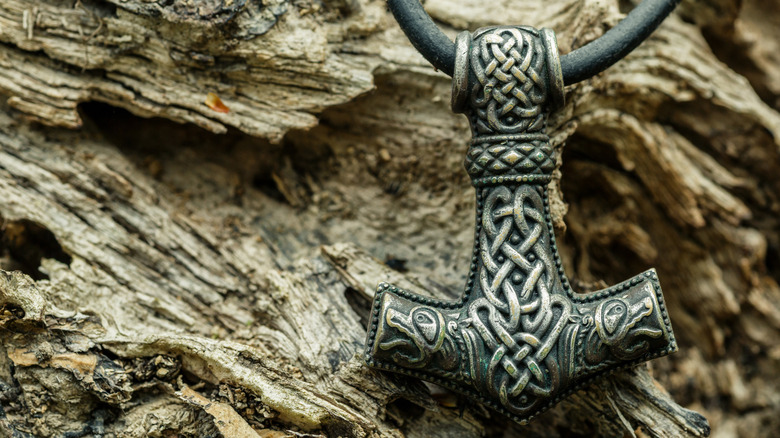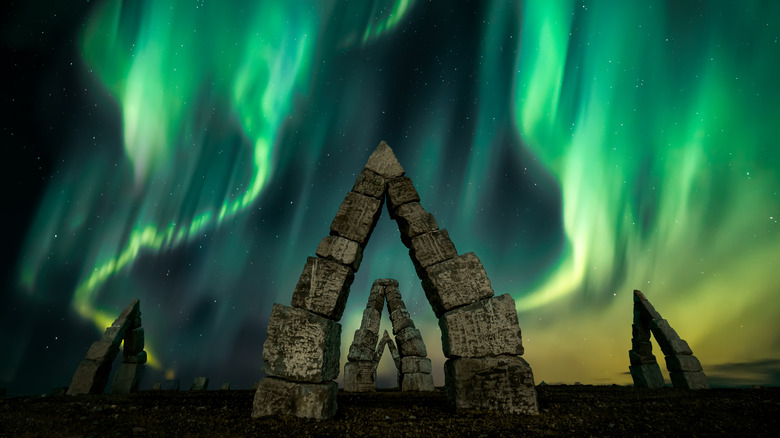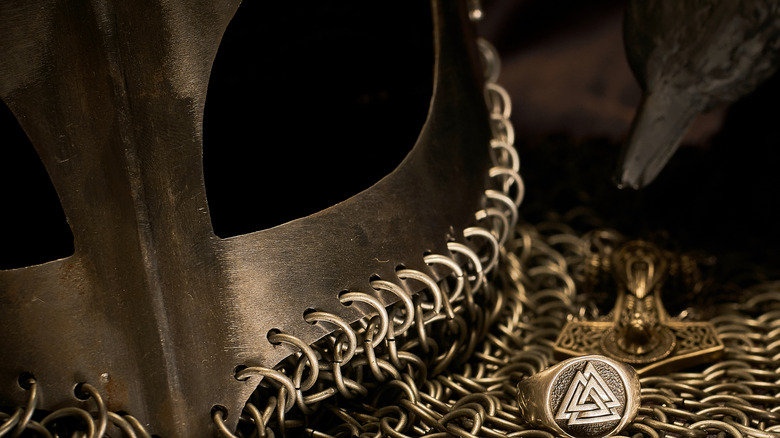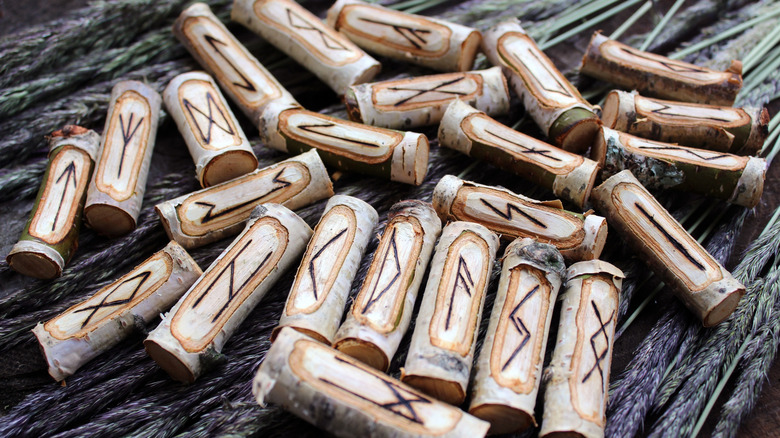Here's What Norse Pagans Believe Today
By now, stories of Odin the All-Father, Thor the thunder god, Loki the trickster, the world tree Yggdrasil, the realm of the gods Asgard, and much more have become a part of our global society and shared monoculture. Such "Norse mythology" extends way, way back before modern-day MCU depictions to the ancient Nordic nations of modern-day Scandinavia: Norway, Sweden, and Denmark. They traveled with these nations' Vikings — those much-romanticized, seafaring raiders — down into Germany, France, and England, out to Russia and the Baltic region, and west to Iceland, Greenland, and even North America during an age of mass settlement and expansion known as the Viking Age (around 800 – 1050 CE, per the Museum of Denmark).
Christianity swept through Scandinavia in the 11th century, effectively ending the Viking Age. Even far-flung Iceland officially converted to avoid armed conflict around 1000 CE, per Iceland Mag. But Odin, Thor, Freya, Baldur, Tyr, and more lived on in the hearts of all the people and families comprising Scandinavian society. These stories were never written down, though, and details could have been lost if not for the efforts of folks like Icelandic poet Snorri Sturluson (1178-1241), who compiled tales from various sources and wrote them down in poetry (the "Poetic Edda") and prose (the "Prose Edda"), as the Icelandic Literature Center explains.
And now, people around the world — "pagan," "heathen," "ásatrúar," take your pick — have gone back to these ancient stories for guidance, fulfillment, and spiritual strength.
The nine noble virtues
The most critical part to understand about modern-day Norse paganism (or heathenism) is that there is no central authority or "church," no canonical texts, no masters and hierarchies, no entangled theology, no prescribed rules or rituals, and no unified codes of action or belief. Even though modern-day pagans try to go back to the source as much as possible — the ways and culture of ancient Scandinavia — and even though they're all relying on the same information, it's accurate to say there is a different way of life for each individual, bound by shared values. These values, in a nutshell, are sometimes defined as the "nine noble virtues" (per Honor the Roots): courage, truth, honor, fidelity, discipline, hospitality, self-reliance, industriousness, and perseverance.
Beyond these guideposts, some folks practice by themselves, other with communities, some create their own rituals, others perform none, some believe in actual entities like Odin, others that the gods are aspects of humanity, or Jungian archetypes. Lots of pagans are also aware of the influence of other revivalist beliefs such as Wicca or Druidry on Norse heathenism, and want to distinguish themselves from these groups, as Raven Kindred overviews. This is true even though Norse heathenism piggybacked to prominence on the countercultural movement of the 1960s, and tends to imitate elements from other pagan beliefs, such as employing an invocation to the four elements at the start of a "blót," or ceremony: east (air), south (fire), west (water), and north (earth).
The wisdom of Odin
One of the easiest short-hands to wrapping your head around Norse paganism, heathenism, whatever name you give it, is Havamal in the "Poetic Edda." Havamal is a set of poetic verses attributed to Odin that comprise principles for good, common-sense conduct in life. This is important because most pagans agree that action is more relevant than belief, and that what happens after death is not nearly as important as what you do while alive.
Instructor of Nordic Studies at the University of Colorado Boulder, Jackson Crawford, did a recent translation of the "Poetic Edda" in 2015 (available in full on PDF Coffee). Some excerpts read, "Even cows know when they should go home and leave behind the fields, but an unwise man does not know the measure of his own appetite" (stanza 21). "An unwise man thinks anyone who laughs with him is his friend. He doesn't understand that the wise are mocking him, even when he overhears them" (stanza 24). "Only a man who is wide-traveled and has wandered far can know something about how other men think. Such a man is wise" (stanza 18). "A noble man should be silent, thoughtful, and bold in battle. But every man should also be cheerful and happy, till the inevitable day of death" (stanza 15).
And of course, there's the ever famous stanza 76: "Cows die, family die, you will die the same way. But a good reputation never dies for the one who earns it well."
Iceland, Ásatrú, and runes
Currently, Norse paganism has swept across the globe, particularly since the 1970s. In Iceland, Norse beliefs have come to be called "Ásatrú," which (per Viking Styles) roughly translates into "being true to the Aesir," one of the families of the gods that includes Odin, Thor, Baldur, Heimdall, Tyr, and more. Ásatrú is Iceland's fastest-growing, state-sponsored religion and had 3,000 registered members in 2015 (per the BBC). Beyond Iceland, it's impossible to get specific numbers on worldwide pagans because heathenism generally isn't institutionalized.
In 2015, Iceland's ásatrúar (people who follow Ásatrú) were building the Nordic nations' first non-Christian temple, or "hof," in 1,000 years for the purposes of marriages, feasts, seasonal festivals, coming-of-age ceremonies, and more. Iceland has also helped preserve Norse paganism because of the Icelandic Sagas, tales of Vikings put to paper in the 13th – 14th centuries, per the Icelandic Literature Center. If the Eddas provide stories of Norse gods, the Sagas provide insight into the everyday lives of those who followed the gods.
Of course, no starter on Norse paganism would be complete without mentioning runes, magical inscriptions descried by Odin after he sacrificed himself by hanging upside down on the world tree, Yggdrasil, for nine days and nine nights. Runes are still sometimes etched onto items or altars for the purposes of bringing about a desired change in life. Some pagans believe such things as fact, others as symbols, which in the world of heathenry is 100% okay.



